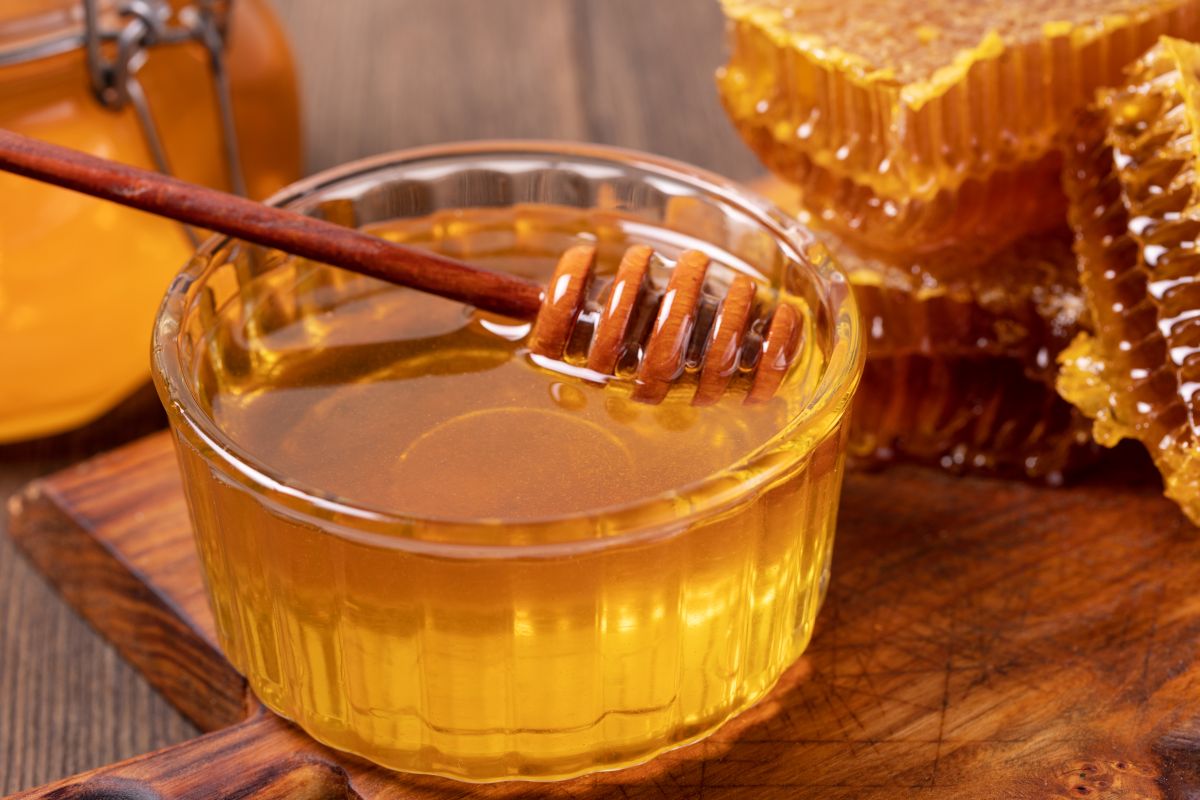Fatty Liver is a condition that occurs because of fat build-up inside the liver. While it varies from person to person, it is usually caused by poor lifestyle choices and eating unhealthy foods.
With sugars being one of the biggest threats for our general health – including that of our liver – you might wonder whether or not honey fits in the same category. This is what we’re discussing today!
Fatty liver can also be caused by alcohol drinking (which is always harmful for the liver), but the most common is Non-Alcoholic fatty liver disease (NAFLD). Recently, scientists have been researching the role of honey in Fatty Liver.
We’re going to talk about it, but also tell you my own experience with consuming honey and reversing my fatty liver (because, in case you’re not a regular – I did reverse it!)
Can you Eat Honey with a Fatty Liver?
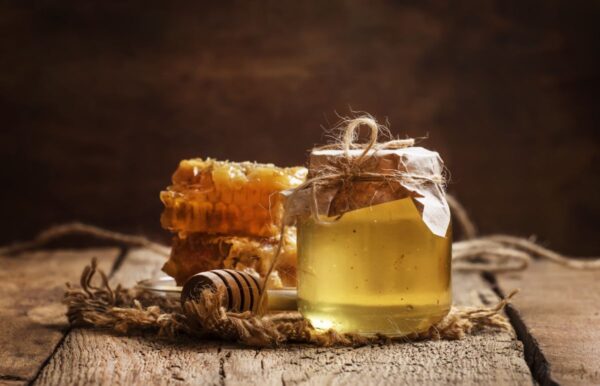
The answer is: YES! Renowned for its healing properties, this natural potion has undergone various pre-clinical and clinical studies to prove its worth in treating many ailments.
Honey has been linked with enhanced liver health and a reduced risk of liver disease. Contrary to popular belief, honey may be the secret weapon we just need, even though it is still high in carbs and should only be consumed with moderation.
Why is Honey Good for Fatty Liver?
In addition to its unique taste, honey possesses all the right tools to help treat – or in the best-case scenario – prevent fatty liver disease.
It fulfills this through its blood sugar control function, good bacteria source, and antioxidant power. Let’s explore one benefit at a time! (*sources: here and here)
First off, we have ‘Blood Sugar Control’. Due to its equal composition of glucose and fructose, honey provides optimal glycogen storage conditions in liver cells. This in turn helps protect the liver from fatty liver disease.
To put it simply, insufficient storage of glycogen causes the release of stress hormones which in time will damage glucose metabolism, leading to insulin resistance and finally fatty liver disease.
So even though honey does have a high carb content, it is a solid sugar alternative because it won’t cause the massive blood sugar level spike that sugar causes, while also adding some other important nutrients to the mix.
IMPORTANT: I have mentioned this on the website, but I feel I should mention it here again: we’re talking here about people that have a fatty liver but not also diabetes.
In that case, things will change and most likely honey is not recommended in your diet. Always talk to a doctor to know what works for your particular situation!
Back to honey, it’s second benefit is being a ‘good bacterial source’. It’s no secret that all of us have bacteria living inside us. They are called prebiotics or good bacteria, because of their crucial role in ample digestion.
Raw honey has been known to contain 10 species of these healthy bacteria. Since liver injury can be caused by an imbalance of gut bacteria, honey comes to the rescue again thanks to being a gracious host!
It’s so good that in the past, it was used for its antibacterial properties (that is fighting harmful bacteria!)
We saved the best benefit of honey till last which is its ‘antioxidant power’. Honey was shown to have a protective cell outcome against oxidative stress and in lowering lipid content.
This duo effect helps in reducing fats and improving outcomes for fatty liver disease patients. Great news, after all! It seems that we don’t have to give up on all sugary things!
But… you can’t have huge amounts of it either. Let’s get now to what might be the slightly disappointing part…
How much Honey Is Safe to Eat with a Fatty Liver?
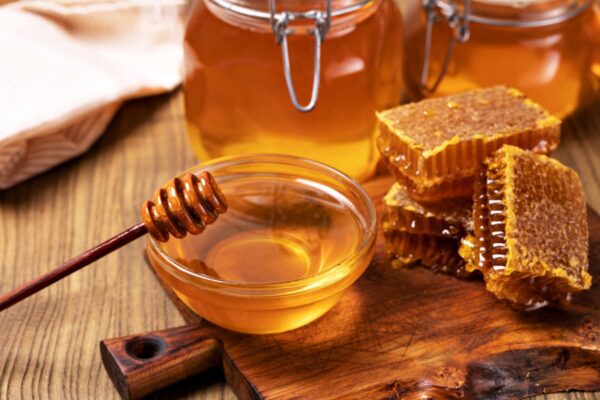
Reaching this part of the article, I know you got all excited about the benefits of honey on our health. But, as I already hinted: you can’t have too much of it, quite the contrary!
Let us not forget at the end of the day honey is composed of sugar – usually around 80% of being carbs.
Nutritional value or not, too much honey can lead to blocking up the digestive system, bloating, diarrhea, and indigestion as well as fat buildup, which is something we don’t need more of!
While I think it’s safe to consume honey each day, I never used more than 1 teaspoon daily. Usually, I consumed much less than that: just 1/4 of a teaspoon with my coffee.
But I still think that one teaspoon of honey each day shouldn’t be too much, as long as you don’t get other sources of sugar. Too much sugar is never good, even when it’s from different sources!
Best Honey Brands for You
Honey comes in all sizes, shapes, tastes, sources, and benefits. Therefore, it’s safe to say that shopping for honey is no easy task!
One of the most important things to know when choosing your honey is this: it has to be raw honey. This means that it was not processed, boiled, had any sugars added or such. It’s the perfect, natural honey that you get directly from the bees.
Since honey in most stores is actually processed, you have below two of my favorite brands to try – both are raw honey and taste amazing!
(Please note: I get commissions if you make a purchases through the links below, at no extra cost for you.)
Australian Manuka Honey
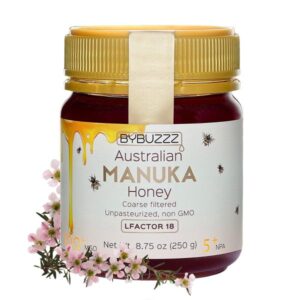
You’ve probably heard a lot about Manuka honey already and even though I don’t necessarily consider it healthier that your regular raw honey, I choose to have it as often as possible.
This particular honey is unpasteurized, non-GMO and tastes absolutely amazing. It is a bit expensive, but when it comes to your health, you shouldn’t really put a price on that.
Plus, you’ll be having it in very small quantities, so one jar will hold a LONG time. In my case, it’s at least one month before I need to replace it – usually a lot more.
Click here to check it out on Amazon
Pure Raw Honey
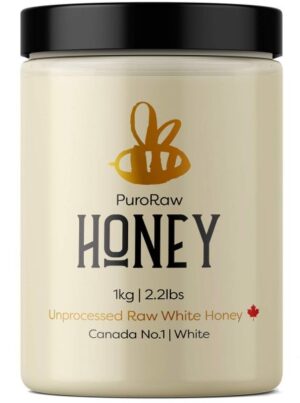
This is another amazing raw honey that I really enjoy serving. This one is made in Canada and is unprocessed, white honey. I like the taste even though the color is a bit strange in my opinion.
The company that produces it considers it one of the finest honeys in the world. It is really good for sure and I highly recommend it.
However, in the end, even if you want to choose a different product, make sure that it is RAW honey that you choose (unpasteurized and not processed in any way). That’s the best honey for fatty liver.
Best Honey Alternatives for You
For its extreme sweetness, there’s another not-so-sweet side to honey. Even though it harbors more health benefits than most of us realize; however, it is not a universal remedy for wellness.
Don’t forget, honey is mainly sugar – a substance that is known to contribute to an array of health problems. Because of this high content of sugar, they may not be suitable for everyone, namely those who are allergic, have diabetes, are obese, or vegans.
Alternatively, some science-backed data have shown that Maple Syrup may play a critical role as well in protecting the liver. If you can’t have honey, trade it for the next best thing which is Maple Syrup.
Alternatives (see the article I linked to at the beginning of this post) also include safe for the liver sweeteners like Stevia or Erythritol.
The Takeaway
Fortunately, there has been sufficient evidence stacking up that recommends the use of honey as an acceptable source of sugar when it comes to the management of fatty liver disease, this is owing to its efficacy and safety.
After displaying its notable health benefit, nutritional value, and rich composition, we can finally conclude that if consumed correctly honey is one of the safest sweeteners that can be used by patients with fatty liver disease.

I was diagnosed with a fatty liver back in 2014 and managed to reverse it by mid-2015. Since then, I’ve been studying it, continuously updating my knowledge with the latest scientific findings and practical approaches to give others the help they need to reverse their condition.
My approach to managing fatty liver is holistic, balancing scientifically-backed information with real-life, practical advice based on personal, direct experience.
I am also the admin of the Fatty Liver Support Group on Facebook and the Fatty Liver Subreddit.

